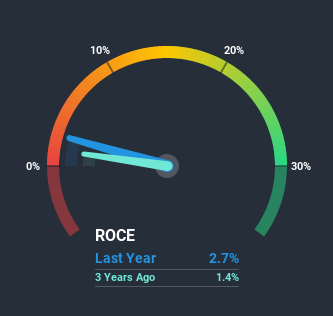- South Korea
- /
- Entertainment
- /
- KOSDAQ:A041510
We're Watching These Trends At SM Entertainment (KOSDAQ:041510)
If you're looking for a multi-bagger, there's a few things to keep an eye out for. In a perfect world, we'd like to see a company investing more capital into its business and ideally the returns earned from that capital are also increasing. Ultimately, this demonstrates that it's a business that is reinvesting profits at increasing rates of return. Having said that, from a first glance at SM Entertainment (KOSDAQ:041510) we aren't jumping out of our chairs at how returns are trending, but let's have a deeper look.
What is Return On Capital Employed (ROCE)?
If you haven't worked with ROCE before, it measures the 'return' (pre-tax profit) a company generates from capital employed in its business. The formula for this calculation on SM Entertainment is:
Return on Capital Employed = Earnings Before Interest and Tax (EBIT) ÷ (Total Assets - Current Liabilities)
0.027 = ₩17b ÷ (₩1.0t - ₩366b) (Based on the trailing twelve months to September 2020).
Therefore, SM Entertainment has an ROCE of 2.7%. Ultimately, that's a low return and it under-performs the Entertainment industry average of 8.4%.
Check out our latest analysis for SM Entertainment

Above you can see how the current ROCE for SM Entertainment compares to its prior returns on capital, but there's only so much you can tell from the past. If you'd like to see what analysts are forecasting going forward, you should check out our free report for SM Entertainment.
How Are Returns Trending?
In terms of SM Entertainment's historical ROCE movements, the trend isn't fantastic. Around five years ago the returns on capital were 12%, but since then they've fallen to 2.7%. And considering revenue has dropped while employing more capital, we'd be cautious. This could mean that the business is losing its competitive advantage or market share, because while more money is being put into ventures, it's actually producing a lower return - "less bang for their buck" per se.
While on the subject, we noticed that the ratio of current liabilities to total assets has risen to 36%, which has impacted the ROCE. Without this increase, it's likely that ROCE would be even lower than 2.7%. While the ratio isn't currently too high, it's worth keeping an eye on this because if it gets particularly high, the business could then face some new elements of risk.Our Take On SM Entertainment's ROCE
From the above analysis, we find it rather worrisome that returns on capital and sales for SM Entertainment have fallen, meanwhile the business is employing more capital than it was five years ago. It should come as no surprise then that the stock has fallen 20% over the last five years, so it looks like investors are recognizing these changes. With underlying trends that aren't great in these areas, we'd consider looking elsewhere.
If you're still interested in SM Entertainment it's worth checking out our FREE intrinsic value approximation to see if it's trading at an attractive price in other respects.
While SM Entertainment isn't earning the highest return, check out this free list of companies that are earning high returns on equity with solid balance sheets.
When trading SM Entertainment or any other investment, use the platform considered by many to be the Professional's Gateway to the Worlds Market, Interactive Brokers. You get the lowest-cost* trading on stocks, options, futures, forex, bonds and funds worldwide from a single integrated account. Promoted
New: Manage All Your Stock Portfolios in One Place
We've created the ultimate portfolio companion for stock investors, and it's free.
• Connect an unlimited number of Portfolios and see your total in one currency
• Be alerted to new Warning Signs or Risks via email or mobile
• Track the Fair Value of your stocks
This article by Simply Wall St is general in nature. It does not constitute a recommendation to buy or sell any stock, and does not take account of your objectives, or your financial situation. We aim to bring you long-term focused analysis driven by fundamental data. Note that our analysis may not factor in the latest price-sensitive company announcements or qualitative material. Simply Wall St has no position in any stocks mentioned.
*Interactive Brokers Rated Lowest Cost Broker by StockBrokers.com Annual Online Review 2020
Have feedback on this article? Concerned about the content? Get in touch with us directly. Alternatively, email editorial-team (at) simplywallst.com.
About KOSDAQ:A041510
SM Entertainment
Engages in music/sound production, talent management, and music/audio content publication activities in South Korea and internationally.
Flawless balance sheet and fair value.
Similar Companies
Market Insights
Weekly Picks


Crazy Undervalued 42 Baggers Silver Play (Active & Running Mine)


Fiducian: Compliance Clouds or Value Opportunity?

Willamette Valley Vineyards (WVVI): Not-So-Great Value
Recently Updated Narratives


ADNOC Gas future shines with a 21.4% revenue surge

Watch Pulse Seismic Outperform with 13.6% Revenue Growth in the Coming Years

Significantly undervalued gold explorer in Timmins, finally getting traction
Popular Narratives


MicroVision will explode future revenue by 380.37% with a vision towards success


NVDA: Expanding AI Demand Will Drive Major Data Center Investments Through 2026





